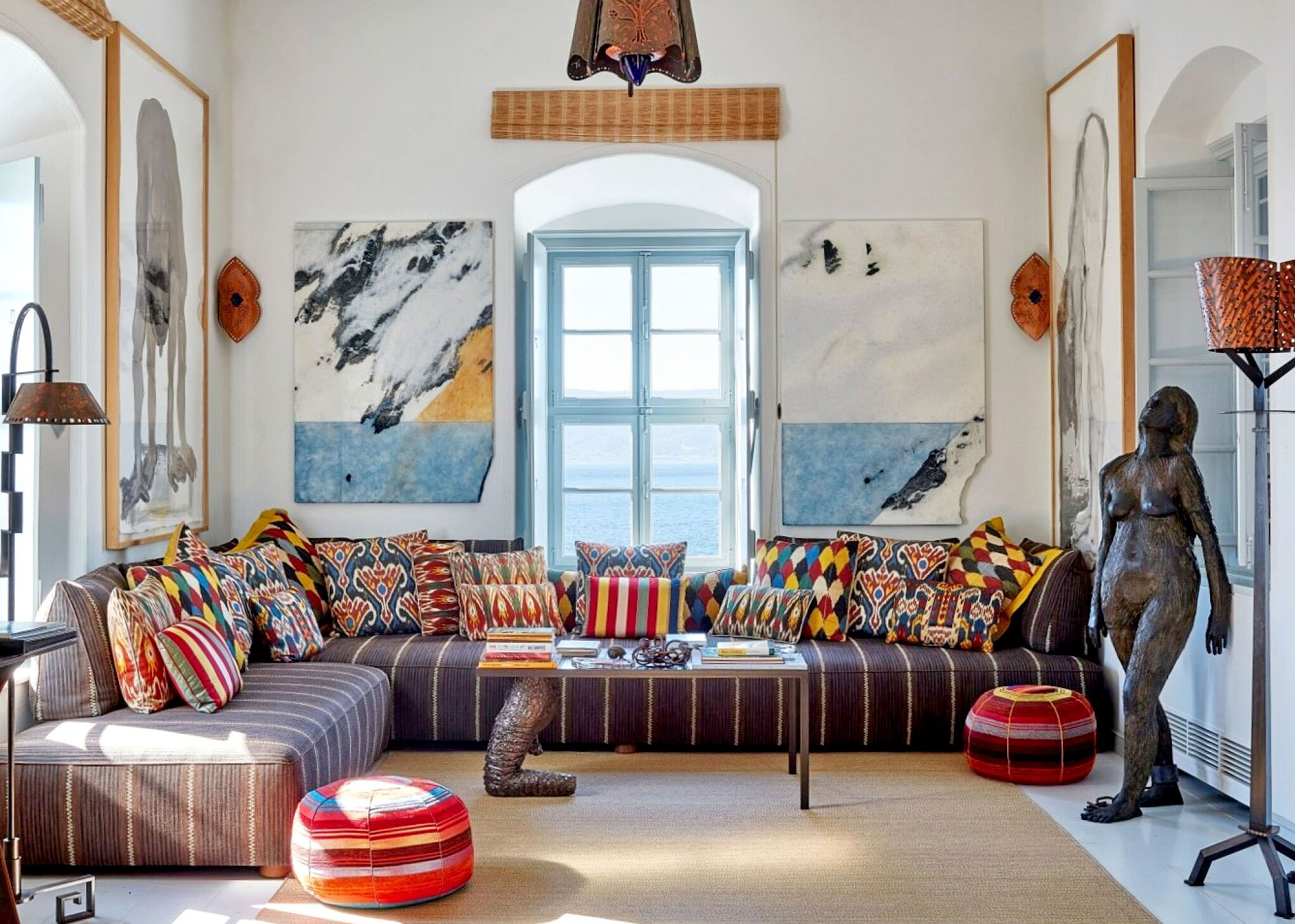
It was a chance encounter with a well-connected shipping magnate in 1970s Greece that launched Pauline Karpidas on her extraordinary voyage into art collecting—a journey that turned her sale at Sotheby’s Paris last week into the most valuable single-owner auction in France so far this year, according to the auction house.
Pauline and Constantinos Karpidas met in the clothing store she had just opened in Athens, fresh from the U.K. They hit it off and married soon thereafter. With some experience collecting, Constantinos set about introducing his new wife to Alexander Iolas, the legendary Greek-American dealer who’s often credited with discovering Andy Warhol. It’s thought that Iolas came out of retirement to help Pauline lead the couple’s art collecting, with an eye toward contemporary.
Pauline and Constantinos Karpidas. Courtesy of Sotheby’s.
They relocated from Athens to the Greek island of Hydra, where they collected with abandon. Among their highest profile acquisitions was Warhol’s painting 200 One Dollar Bills (1962), which they scooped up in 1986 for $385,000. (They sold it at Sotheby’s New York in 2009 for more than $43 million, nearly six times its low estimate, according to the Artnet Price Database.)
From the beginning, Pauline’s modus operandi has been to discover young artists and help them hone their talents. Decades on, so instrumental has she been to countless careers that she’s often compared to art patrons Peggy Guggenheim and Dominique de Menil. “The most important art world figures of recent decades have unanimously acknowledged Pauline’s immense stature, her generosity, wisdom, passion, and irrepressible joie de vivre,” said Oliver Barker, chairman of Sotheby’s Europe.
He added that the enthusiasm he witnessed from bidders in the two-day auction concluding October 31 was a testament to Pauline’s tireless championing of talent. The grand total of €35.6 million ($37.6 million) soared past its presale estimate of €11.8 million–€17.1 million. Of the 237 lots on offer, only five failed to sell—making for a 98 percent sell-through rate—and two-thirds sold above their high estimates. Of that amount, roughly 63 percent (€22.7 million) derived from the evening sale alone, consisting of only 37 items.
Brice Marden, Hydra View, estimate: €380,000–€450,000. Courtesy of Sotheby’s.
One highlight of the evening sale was Brice Marden’s stunning marble diptych Hydra View (2011–12), which went for just over €1 million ($1.1 million), following an extended bidding battle, according to Sotheby’s. A vivid example of the artist’s work in stone, the appropriately titled piece flanked a window of the Hydra house that looked out onto the bright turquoise of the Aegean Sea.
Georg Baselitz, Untitled (Weiblicher Akt) (1977), pictured above a console table by Mattia Bonetti (2009). Courtesy of Sotheby’s.
The German artist Georg Baselitz also had a strong showing in the evening sale. His painting Untitled (Weiblicher Akt) (1977) realized €533,400 ($566,369), roughly double its presale estimate. The work depicts a single female figure in the artist’s celebrated inversion technique, leaving the viewer unsure if she is standing, floating, or diving into water.
The day portion of the auction featured 200 lots by a coterie of artists Pauline hosted at her Hydra Workshops between 1997 and 2017. She set up the art space in an old ship-repair shop with the aim of showing her new acquisitions each year with those very artists present.
Left: Pauline Karpidas with Tracey Emin. Photo: Johnnie Shand Kydd © Adagp, Paris, 2023. Right: Grayson Perry on Hydra in 1996. Photo: Johnnie Shand Kydd © Adagp, Paris, 2023.
One of the earliest of these workshops was headlined by Grayson Perry—who had several ceramic works in both Sotheby’s evening and day sales—in one of the artist’s first viewings. Since then, the hotly anticipated shows have featured some of the most influential artists of the early 21st century, such as Wilhelm Sasnal, Urs Fischer, Sergej Jensen, Matt Johnson, Mark Grotjahn, and Ryan Sullivan. The summer gatherings became the stuff of legend, transforming Hydra into an international art hub buzzing with artists, curators, writers, and collectors.
The lead items from the day sale included a work on paper by Tracey Emin, which sold for €29,210 ($31,365, five times its high estimate), two Frank Benson works including Human Statue (Jessie), which went for €69,850 ($75,000, nearly five times its high estimate), and Polish artist Paulina Olowska’s L’introvertie, which quadrupled its high estimate to land at €82,550 ($88,640).
Left: Frank Benson, Human Statue (Jessie) (2011). Courtesy of Sotheby’s. Right: Paulina Olowska, L’introvertie (2012). Courtesy of Sotheby’s.
Lalanne bronzes by both Claude and François-Xavier saw excellent results, too. Claude’s Très grand choupatte, an endearing cabbage head guarding the front door of the Hydra mansion, sold for €4.9 million ($5.3 million), blowing past its high estimate of €1.5 million. The lofty price represents a new auction record for the artist, who met Pauline in 1978 on her first visit to Les Lalanne’s home in Ury, outside of Paris—introduced by Alexander Iolas.
Claude Lalanne, Très grand choupatte (2008). Courtesy of Sotheby’s.
“It has been an honor to work with the Karpidas family on such an immaculate collection,” added Sotheby’s Oliver Barker, “which had been exquisitely designed and curated and was guarded as a glorious private sanctuary of art for so many years. And so, the story of Hydra will continue in the homes of many new loving owners around the world.”